- Home
- Cryptocurrency
- AbstraDex (X Layer) Review: Security Risks, Low Liquidity, and Why You Should Stay Away
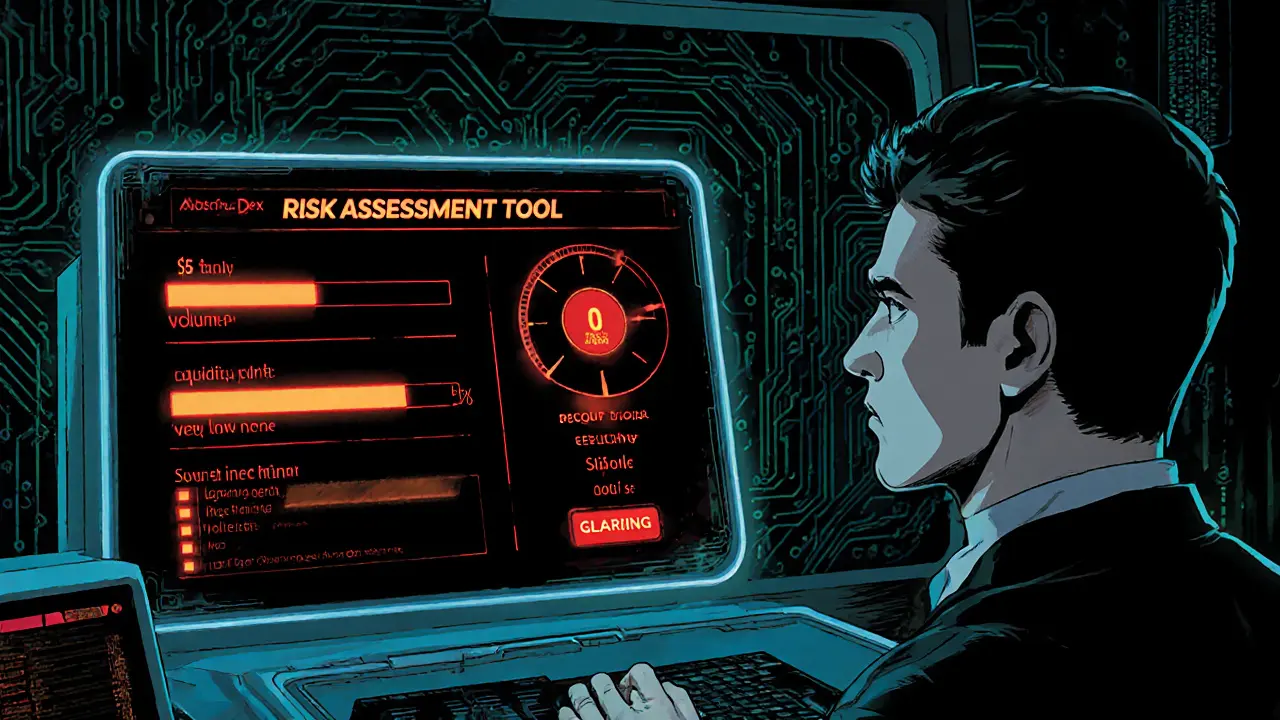
AbstraDex (X Layer) Review: Security Risks, Low Liquidity, and Why You Should Stay Away
AbstraDex Risk Assessment Tool
| Exchange | Daily Volume (USD) | Trading Pairs | KYC Required | Trust Score | Risk Level |
|---|---|---|---|---|---|
| AbstraDex (X Layer) | $5 | 2 | No | 0 | High |
| PotatoSwap (X Layer) | $1.2M | ≈150 | No | 78 | Medium |
| Uniswap (Ethereum) | $1.8B | ≈10,000 | No | 92 | Low |
| PancakeSwap (BSC) | $620M | ≈5,000 | No | 88 | Medium |
When it comes to AbstraDex is a decentralized cryptocurrency exchange built on the X Layer blockchain, the buzz is less about excitement and more about warning signs. AbstraDex review quickly uncovers a platform that offers privacy but delivers barely any liquidity, almost no trading pairs, and a laundry list of security red flags.
Quick Take
- Only 3 tokens and 2 trading pairs are available - volume hovers around $5 per day.
- Zero KYC, but multiple security warnings from Holder.io and CoinGecko (trust score 0).
- Operates on X Layer, a Polygon‑powered Layer2 launched by OKX.
- Liquidity is so thin that slippage can exceed 50% on modest trades.
- Most experts advise avoiding the platform until a full audit and roadmap are published.
What Is AbstraDex?
AbstraDex markets itself as a non‑custodial, privacy‑first DEX. It lives on X Layer, which uses Polygon’s Chain Development Kit (CDK) and zero‑knowledge tech to promise sub‑second block times (≈400ms) and transaction fees under half a cent.
The platform does not require any Know‑Your‑Customer (KYC) verification, which appeals to users seeking anonymity. However, that same lack of onboarding also means there’s no built‑in anti‑fraud layer.
Technical Specs and Trading Options
As of October2025, AbstraDex lists only three cryptocurrencies - typically a native token, a stablecoin, and a wrapped asset - forming just two trading pairs. The interface offers the bare minimum: connect a Web3 wallet, select a pair, and hit ‘Swap.’ There is no order‑book, limit orders, or advanced charting.
Because the exchange runs on Polygon (via X Layer), transaction costs average $0.0005USD, and confirmation times are fast. In practice, the ultra‑low fees are irrelevant when you can’t even find a counter‑party for your trade.
Security and Trust Ratings
Security is the biggest red flag. Holder.io has issued an explicit warning that the project may be manipulating smart contracts and withdrawing user funds without notice.
Similarly, CoinGecko assigns AbstraDex a trust score of0, the lowest rating possible, and lists its operational status as “Not active.”
There is no public audit from a recognized firm, and the source code has seen little scrutiny from the broader security community. For anyone who isn’t a seasoned Solidity auditor, interacting with these contracts is a gamble.

Liquidity and Market Activity
Liquidity is virtually non‑existent. The platform’s 24‑hour trading volume fluctuates between $3.35 and $5, representing a market‑share of 0.0000000016% according to Holder.io data. In the X Layer ecosystem, AbstraDex ranks 5th out of 5 DEXs, handling only 1,017 transactions in a week - a tiny 0.05% of total DEX activity on the chain.
By comparison, the leading X Layer DEX PotatoSwap processes over 1.8million transactions daily, capturing more than 97% of the chain’s DEX volume. Major cross‑chain DEXs like Uniswap and PancakeSwap routinely move billions of dollars each day.
How to Use AbstraDex (If You Still Want To)
Using the platform requires a compatible Web3 wallet (MetaMask, Trust Wallet, etc.). Once connected, you interact directly with the exchange’s smart contracts - there is no custodian to fall back on if something goes wrong.
Given the security warnings, you should:
- Download the contract address from a trusted source and verify it on a block explorer.
- Run the bytecode through a static analysis tool (e.g., Slither) or hire a security auditor.
- Test with a minimal amount (≤0.001ETH) to gauge slippage and confirm the transaction succeeds.
- Keep a separate wallet for any funds you plan to trade, never reuse your primary storage wallet.
Even after these steps, the risk of total loss remains high because the platform’s liquidity pool can’t guarantee price stability, and the smart contracts have not been independently verified.
Side‑by‑Side Comparison
| Exchange | Daily Volume (USD) | Trading Pairs | KYC Required | Trust Score |
|---|---|---|---|---|
| AbstraDex (X Layer) | $5 | 2 | No | 0 |
| PotatoSwap (X Layer) | $1.2M | ≈150 | No | 78 |
| Uniswap (Ethereum) | $1.8B | ≈10000 | No | 92 |
| PancakeSwap (BSC) | $620M | ≈5000 | No | 88 |
Verdict: Should You Trade on AbstraDex?
Short answer: No, unless you’re conducting a security research experiment and can afford to lose every cent you send.
The platform’s ultra‑low liquidity means you’ll likely experience massive slippage, the lack of audits leaves the smart contracts exposed to potential exploits, and the trust scores from both Holder.io and CoinGecko signal a high probability of malicious behavior.
For privacy‑focused traders, there are safer alternatives that still offer no‑KYC access - for example, Uniswap on Ethereum, or PancakeSwap on BSC - both have robust audit histories, deep liquidity, and active communities.
Until AbstraDex publishes a transparent roadmap, undergoes an independent audit, and can demonstrate genuine trading activity, the prudent move is to stay away.
Frequently Asked Questions
Is AbstraDex a scam?
While we cannot label it definitively without legal proof, multiple independent warnings (Holder.io, CoinGecko) point to high‑risk behavior, including possible smart‑contract manipulation and unannounced fund withdrawals.
Do I need to complete KYC to use AbstraDex?
No. The exchange operates as a non‑custodial DEX, so you only need a compatible Web3 wallet.
What are the available trading pairs?
Only two pairs are listed, typically a native token‑to‑stablecoin and a wrapped asset‑to‑stablecoin. Exact token symbols change occasionally but remain within a three‑token universe.
How can I check if the smart contracts are safe?
You would need to audit the bytecode with tools like Slither or MythX, or hire a reputable blockchain security firm. No public audit has been released by the team.
Is there any community support for AbstraDex?
Community activity is minimal. Discussion threads are scarce, and there are no official support channels or documentation beyond a basic landing page.
Can I earn fees by providing liquidity on AbstraDex?
Liquidity pools exist but are so shallow that the impermanent loss and transaction fees outweigh any potential rewards. Most users avoid providing liquidity altogether.
Cormac Riverton
I'm a blockchain analyst and private investor specializing in cryptocurrencies and equity markets. I research tokenomics, on-chain data, and market microstructure, and advise startups on exchange listings. I also write practical explainers and strategy notes for retail traders and fund teams. My work blends quantitative analysis with clear storytelling to make complex systems understandable.
Popular Articles
19 Comments
Write a comment Cancel reply
About
DEX Maniac is your hub for blockchain knowledge, cryptocurrencies, and global markets. Explore guides on crypto coins, DeFi, and decentralized exchanges with clear, actionable insights. Compare crypto exchanges, track airdrop opportunities, and follow timely market analysis across crypto and stocks. Stay informed with curated news, tools, and insights for smarter decisions.

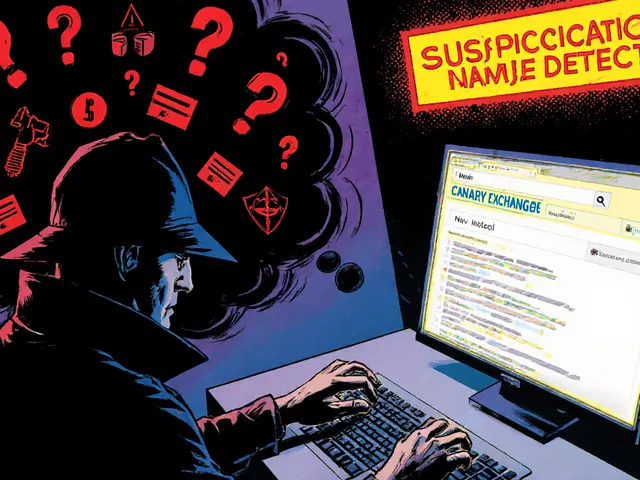

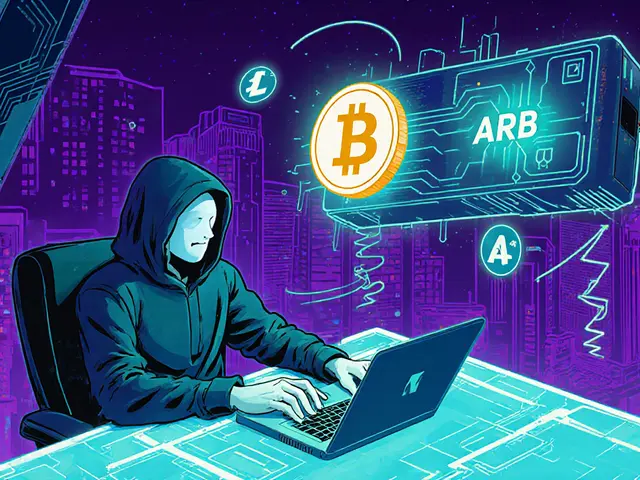

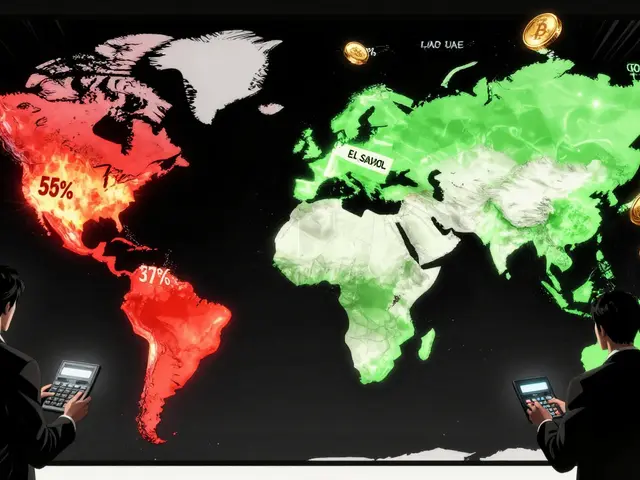


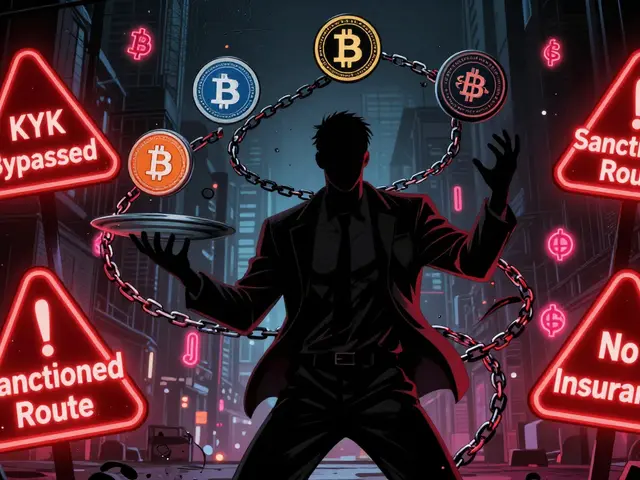

Well, if you haven't already subscribed to the next big crypto apocalypse, let me paint the picture for you. AbstraDex is the perfect storm where anonymity meets an abyss of liquidity, and the only thing getting audited is the collective sigh of disappointed investors. They brag about zero‑KYC like it's a badge of honor, but what they really sell is a front‑row seat to a possible rug pull that could make your grandmother's retirement fund disappear. The fact that Holder.io and CoinGecko both hand out trust scores of zero should set off alarms louder than any fire alarm in a burning server farm. And let's not forget the secretive X Layer team, whose whitepapers are so cryptic they could double as a bedtime story for conspiracy‑theorists. Every transaction you make is basically handing over control to a set of smart contracts that have never been examined by an independent auditor-think of it as a digital Ouija board. If you ever wondered what it feels like to gamble with your life savings in a casino that hasn't paid its taxes in decades, you’ve found it. The liquidity is so thin that a $10 trade could wipe out half the pool, leaving you with slippage that would make a hurricane look gentle. Meanwhile, the platform’s roadmap is as empty as a blockchain after a fork that never happened. In short, this is not an exchange; it's a black hole dressed up in fancy code, waiting to swallow the naïve and the desperate alike. So unless you’re planning a grand experiment in watching smart contracts implode, steer clear, lock your wallets, and maybe invest in something that actually has a pulse.
One might argue that the very opacity you lament is, paradoxically, the raison d'être of a decentralized marketplace, yet the absence of a third‑party audit undermines the very philosophical foundations of trust we hold dear. The metaphysical tension between freedom and security becomes palpable when the codebase is shrouded in mystery. It raises the classic question: does liberty without accountability devolve into anarchy? :)
Liquidity is effectively nonexistent.
Hey, I get the vibe-trading on a platform where the order book is basically a ghost town can feel like shouting into the void. But there are a few alternative DEXs on other layers that give you the same privacy without the heartbreak of empty pools. Keep exploring, and you’ll find a spot where your swaps actually go through.
Oh, the drama! Here we have another "revolutionary" exchange that promises anonymity while serving up a side of existential dread. The developers act like they're the secret agents of finance, but the only thing secret is how little depth they have under the surface. You can almost hear the collective gasp as $5 in daily volume tries to hustle its way past a $0 trust score. It's like watching a magician pull a rabbit out of an empty hat and then realizing the rabbit was never there. The whole thing reeks of a bait‑and‑switch, and anyone with half a brain should run for the hills before they get tangled in a rug pull.
Don't let the theatrics scare you off completely-there are valuable lessons to be learned here. The key takeaway is to always verify contracts, test with the smallest amount possible, and diversify your exposure across multiple platforms. Think of it as a safety net rather than a condemnation of the entire DeFi space. 🌟
For anyone considering a DEX, it’s essential to look beyond the headline features and evaluate the underlying infrastructure. AbstraDex runs on X Layer, which inherits the security model of Polygon but adds its own nuances. While the low transaction fees are attractive, the shallow liquidity dramatically raises slippage risk. Users should compare the total value locked (TVL) and audit reports when choosing a platform. A diversified approach, swapping small amounts on multiple exchanges, can mitigate potential losses.
I totally agree with the analysis-especially the part about slippage. In my experience, even a modest trade can end up costing twice the intended amount when the pool depth is that thin. It’s a good reminder to always run a quick simulation before committing real funds.
The risk matrix for AbstraDex spikes to a critical threshold due to zero‑audit provenance and negligible market‑making depth. From a capital allocation perspective, exposure should be nullified pending a comprehensive forensic code review. TL;DR: avoid.
Just a heads‑up, the community around this DEX is pretty quiet, so you won’t find much support if things go sideways.
That’s a solid point! If you’re still curious, try pinging the few active members on Telegram-they might share tips on safe interaction, but always keep your stakes minimal.
i think its overrated, its just the same old shit with a new name.
I’ve seen similar situations where projects launch with hype and then fade quickly; it’s a pattern worth noting.
While the observation is fair, labeling every low‑liquidity DEX as a “dead horse” ignores the niche use‑cases where privacy outweighs volume. Nonetheless, caution remains paramount.
One cannot help but notice the symphony of concealed motives echoing through the corridors of AbstraDex’s codebase. It is as if the architects have deliberately woven a tapestry of obscurity to shield a grander stratagem, perhaps a coordinated effort to siphon capital under the guise of decentralisation. The alignment of a zero‑trust score with an undisclosed audit history reads like a cipher for a deeper financial experiment, one that could be orchestrated by shadowy entities seeking to test market resilience. In the grand tapestry of crypto ecosystems, this platform may well be a laboratory for elite innovators, or a Trojan horse slotted to infiltrate unsuspecting wallets. Either way, the veil is thin, and those who peer beyond it must do so with a healthy dose of scepticism and a robust set of analytical tools.
I appreciate the nuanced perspective and would add that maintaining a respectful dialogue helps keep the community informed without veering into unfounded speculation.
It is profoundly disheartening to witness yet another platform masquerading as a champion of privacy while betraying the very principles of financial integrity that we, as a collective, should uphold. The developers’ blatant disregard for basic security protocols-opting for zero audits and an abysmal trust score-reflects a moral vacuum that we cannot simply excuse in the name of innovation. When they flaunt “no KYC” as a badge of honor, they are in fact exploiting the most vulnerable users, luring them with the promise of anonymity only to expose them to potential fraud and loss. This reckless cavalier attitude toward user protection is an affront to the ethical standards that should govern any financial service, decentralized or otherwise. Moreover, the absurdly low liquidity creates a scenario where even the smallest trade can wreak havoc on market stability, thereby endangering the broader ecosystem. We must, therefore, collectively condemn such reckless ventures and advocate for a more responsible, audit‑driven approach to decentralized finance, lest we continue to feed a cycle of exploitation under the pretense of progress.
Your concerns are well articulated; adhering to rigorous audit standards and transparent governance is indeed essential for fostering trust within the DeFi community.
Honestly, I think the hype is overblown-people love to demonize anything they don’t understand.